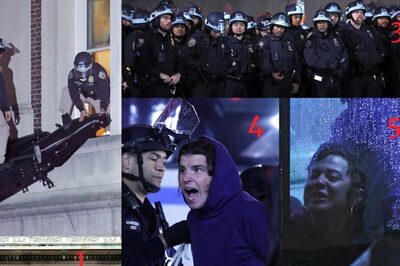
views
The U.S. government put convicted rapist and murderer William LeCroy to death by lethal injection on Tuesday, the sixth federal execution this summer after a lengthy hiatus in capital punishment at the national level.
LeCroy, 50, was pronounced dead at 9:06 p.m. EDT after officials with the U.S. Bureau of Prisons administered him a fatal dose of the barbiturate pentobarbital at the bureau’s execution chamber in Terre Haute, Indiana, an agency spokeswoman said.
The execution came shortly after the U.S. Supreme Court denied an 11th-hour petition seeking a stay until LeCroy’s principal lawyer, who suffers from a chronic health condition, could travel safely to Terre Haute without fear of contracting COVID-19.
It marked the sixth death sentence the U.S. government has carried out during the past three months, more than the total number of federal executions carried out under all of President Donald Trump’s White House predecessors combined going back to 1963.
Another execution was planned for Thursday, when Christopher Vialva, a convicted murderer, is set to become the first Black man to face the federal death penalty under Trump, who has long been an outspoken advocate for capital punishment.
The Trump administration ended an informal 17-year-hiatus in federal executions in July, after announcing last year that the Bureau of Prisons was switching to a new single-drug protocol for lethal injections, from a three-drug combination it last used in 2003.
The new protocol revived long-running legal challenges to lethal injections. Last month, U.S. District Judge Tanya Chutkan in Washington, D.C., sided with condemned inmates in ruling that the Justice Department was violating the Food, Drug, and Cosmetic Act in not seeking a doctor’s prescription to administer the highly regulated barbiturate.
But a three-judge panel of the U.S. Circuit Court of Appeals for the District of Columbia Circuit said the violation did not in itself amount to “irreparable harm” and allowed federal executions to proceed.
Chutkan previously issued multiple orders halting planned executions while litigation continued. Each of those was overturned by either the Circuit Court or the U.S. Supreme Court, whose conservative majority said that legal challenges to pentobarbital injections, also used by several state governments to execute prisoners, were unlikely to prevail.
LeCroy was convicted and sentenced to death in Georgia in 2004 for the carjacking, rape and murder of Joann Tiesler, a 30-year-old nurse, after breaking into her home. He was caught two days later in Tiesler’s vehicle at the U.S.-Canadian border with notes scribbled on the back of a torn map, according to prosecutors.
“Please, please, please forgive me Joanne,” read one note by LeCroy, who misspelled the victim’s name. “You were an angel and I killed you. Now I have to live with that and I can never go home. I am a vagabond and doomed to hell.”
Disclaimer: This post has been auto-published from an agency feed without any modifications to the text and has not been reviewed by an editor




















Comments
0 comment